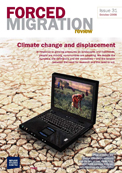 The United Nations High Commission for Refugees (UNHCR) has recently updated their policy paper entitled Climate change, natural disasters and human displacement: a UNHCR perspective, which was originally released October 2008. The 14-page paper looks at the human side of climate change, particularly the status and protection needs of those who are most directly affected.
The United Nations High Commission for Refugees (UNHCR) has recently updated their policy paper entitled Climate change, natural disasters and human displacement: a UNHCR perspective, which was originally released October 2008. The 14-page paper looks at the human side of climate change, particularly the status and protection needs of those who are most directly affected.
The ongoing theme of this document is the need to encourage more research and reflection on the humanitarian and displacement challenges that climate change will generate. It opens with a quote from António Guterres, the UN High Commissioner for Refugees:
“Although there is a growing awareness of the perils of climate change, its likely impact on human displacement and mobility has received too little attention.”
The paper makes a huge advances in the recognition of environmental migrants from the October 2008 version, stating:
“While environmental factors can contribute to prompting cross-border movements, they are not grounds, in and of themselves, for the grant of refugee status under international refugee law. However, UNHCR does recognise that there are indeed certain groups of migrants, currently falling outside of the scope of international protection, who are in need of humanitarian and/or other forms of assistance.”
The paper is divided into four sections and examines the following:
1) foreseeable displacement scenarios,
2) their implications for UNHCR,
3) terminology and the 1951 Refugee Convention,
4) suggestions for the way forward.
According to the paper, UNHCR admits that it “might take some time to reach an agreement on the appropriate way forward” and “more work is needed to analyze the likely human displacement scenarios which climate change will cause, and to identify and fill any legal and operational gaps”. In the meantime, UNHCR “encourages the international community to adopt approaches based on respect for human rights and international cooperation”. UNHCR also believes that “the need for advocacy on climate change issues will remain in various fora into 2010 and beyond”.



